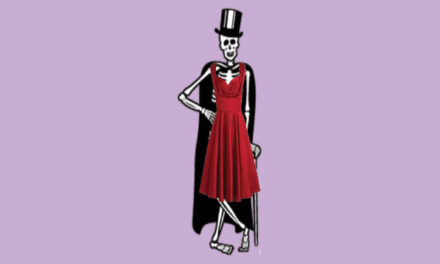For Visiting Assistant Professor Isabella Alexander, a normal day in Morocco consists of scavenging dump sites for food scraps and hiding film in the soles of her shoes. At night, she takes cat naps on the ground, remaining alert to signs of a police raid.
An American journalist fluent in Arabic, Alexander said that she is prone to experience those conditions as a foreigner filming the sub-Saharan migrants and refugees exposed to countless human rights violations. Alexander lived in the northern enclaves of Morocco several times over the course of seven years and continues to return annually, spending part of each year hidden from state-authorities and any sign of city life. Now she plans to expose that story to the world.
Alexander received a Ph.D. in anthropology from Emory in 2016. She is currently working on a book called Burning at Europe’s Borders and is aiming to complete a feature-length documentary called The Burning: An Untold Story from the Other Side of the Migrant Crisis by next summer. At Emory, Alexander has taught an anthropology seminar, “The Migrant and Refugee Crisis,” a course on migration as a global issue. A section of that course centered on the current crisis of migrants and asylum seekers displaced in Morocco and North Africa.
According to Alexander, the human rights crisis involves individuals from war-torn and poverty-ridden sub-Saharan countries seeking asylum in Europe. She said that the migrant crisis is reminiscent of the Syrian refugee crisis as family members often break apart in hopes to reach a better life. Many turn to smuggling rings, which offer displaced peoples a stay in mountain communities called Brotherhoods and an attempt to climb over the Spanish border fence. Others apply for refugee status through governmental organizations, but the rejection rate is over 80 percent.
As a female white American, Alexander said her positionality as an outsider helped establish trust with Moroccan smuggling rings.
“[My position] makes me more vulnerable in a lot of ways,” Alexander said. “But I think my very vulnerability is the reason why I have been able to gain access [to these people] because I don’t present [myself] as a threatening force.”
Alexander said she better understands the mentality of migrants after seeing Spain-sponsored Moroccan police brutally harass and kill young teenage boys on one of her trips.
“I don’t think that death is the ultimate fear [for migrants and refugees],”Alexander said. “They talk about it so casually. I think the fear is of never getting out of the cycle.”
She said her familiarity with migrants and refugees shows that she’s invested in their struggle.
“I listen to how [migrants and refugees] talk about other journalists,” Alexander said. “They say the journalists come to steal our stories and they say that I am coming to tell their stories.”
Back in the classroom at Emory, Alexander’s students attempt to unpack her anecdotes about her work. One of her students, Caroline Cohen (20C), asks herself how this is happening, and how she didn’t know about the crisis before taking that class. Furthermore, Cohen compared the situation in Morocco to that of ISIS in terms of their gravity, and said that the overload of news content is desensitizing.
Alexander said she hopes that the human element of the migrant and refugee crisis that she exposes to her students in class will also show through in her documentary.
“I think the power of storytelling is that you can pull out individuals from the masses and people connect with those individual stories,” Alexander said. “Once you have one person that you think of when you hear about a particular crisis, it becomes that much harder for you to turn away.”
Though Cohen says the information can sometimes be overwhelming to digest, the connection between Alexander’s anecdotes and the crisis is difficult to ignore.
“The situation [in Morocco] is terrible,” Cohen said. “It’s brutal, everyone is poor, and [people] are discriminated [against] because they are migrants.”
Ahead of the documentary’s official release, Alexander has shown part of her film in limited screenings.
“I always have a handful of European and Moroccan students in the audience of the screenings, and the fact that they are shocked and completely unaware that this is unfolding in their very backyard, to me, it really illustrates how important this story is,” Alexander said.
After taking Alexander’s class, Johnna Gadomski (20C) decided she would intern at a refugee center in Atlanta through American Pathways this summer.
“I had never thought of the right to migrate as such an essential part of human rights,” Gadomski said. “[Alexander] definitely changed my perception of human rights, on how subjective it is — who gets human rights and why people are not necessarily afforded the rights that they deserve.”
Gadomski also said that she appreciates Alexander’s commitment to integrate resources from Morocco, such as photos of refugee families and raw cuts from her documentary, into the class.
“She’s done a really good job of … not reducing [the migrants and refugees] down to stories but maintaining their humanity,” Gadomski said.
Alexander said that she hopes the class and the documentary impact the public’s understanding of the migrant and refugee situation in Morocco while changing “concrete practices” at the Spanish-Morocco border.
“We draw a really stark line between these two categories [migrant and refugees] and I hope this film encourages people to think about how they are often one in the same, and how the label that we assign to people is often based on racial or gender prejudices about them and their ability to assert vulnerability in crises,” Alexander said. “Also, how those labels will shape the future that is available or denied to them.”
Editor’s note: The Wheel temporarily removed online this article about Alexander and her work from June 20, 2017 at 10 a.m. to June 25, 2017 at 1:30 p.m. during a period of investigation into Alexander’s safety after readers alerted us to her detention in Algeria. The article was republished once the Wheel determined Alexander was not in danger of imminent physical harm.
CORRECTION (7/18/2017 at 5:30 p.m.): The cutline on the photo originally credited Nafimul Huda as a photo editor. Huda is not a photo editor, he is a senior staff photographer.
CORRECTION (8/10/17 at 10:07 p.m.): The article was updated to reflect that Alexander did not live in Morocco for seven years but rather several times over the past seven years; the correct title of her forthcoming book; the correct title of an Emory course that she taught; and that she did not show a portion of her film at the book festival. Inaccurate descriptions of the human rights crisis in Europe and Africa and government agencies were removed. A sentence was modified to clarify that Alexander does not claim to understand the migrant crisis in full as she is not a migrant herself.
Varun Gupta (20C) is studying political science and philosophy. He seeks discomfort by shadowing people in different professions, such as campus security, a sous chef and bar manager. Apart from the Wheel, you can catch him playing ultimate frisbee or recounting a crazy travel experience from one of 21 different countries that he has visited.





